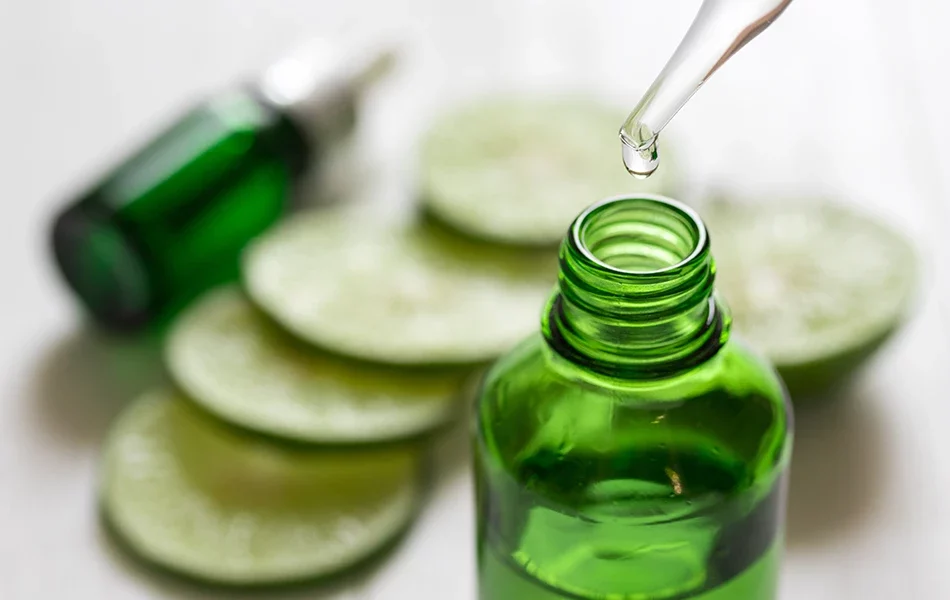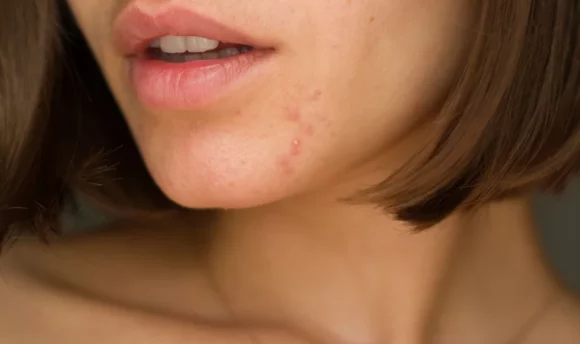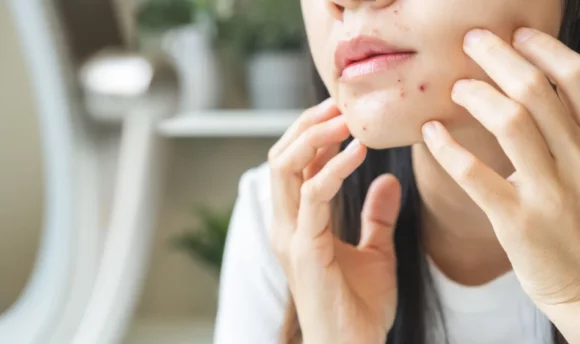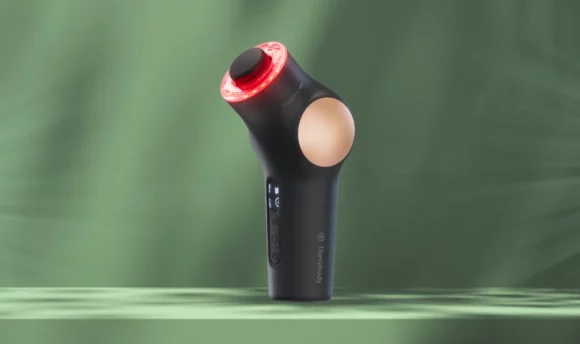Does Vitamin C Help Acne? How to Treat Your Skin
Can vitamin C be used to promote skin health in people with acne-prone and oily skin? Read on to find out the benefits of adding ascorbic acid to your skincare routine.

Acne vulgaris, commonly known simply as acne, is a skin condition that causes pimples and blackheads or whiteheads to appear primarily on the face but also on the back and chest.
Vitamin C is a popular ingredient used in many skincare products, such as serums, creams, cleansers, etc. Many of these products are formulated to target acne. So, does vitamin C help treat acne? Let’s find out.
Does Vitamin C Help Acne, or Should You Skip the Oranges?
Vitamin C, also known as ascorbic acid, is highly effective in the treatment of acne. Of the many serums on the market that promise to make your skin glow, vitamin C serum is the most proven. This explains why it is an ingredient in many skincare products.
Dietary vitamin C is unlikely to reach the skin in the amounts needed to help acne-prone skin. Studies have shown that large amounts of vitamin C can be administered orally and intravenously; however, the efficacy of these methods on skin health is still debatable.
Topical application in the form of serum is the best way to obtain most of the skin benefits of vitamin C. The challenge is to create a stable formulation that penetrates the skin most effectively.
What is Acne?
Acne vulgaris is an inflammatory skin condition that can present as pimples, blackheads (open comedones), or whiteheads (closed comedones). Nearly 80% of Americans suffer from acne at some point in their lives.
The main causes include:
- Excess oil (sebum) production by glands
- Bacteria (Propionibacterium acnes)
- Genetic factors and family history
Acne develops as a result of clogged oil glands and hair follicles. This promotes bacterial colonization and inflammation, leading to pimples, comedones, and scarring when severe and chronic. This is where vitamin C comes in.
What Are the Benefits of Vitamin C in Skincare?
Skincare experts believe that vitamin C is one of the best ingredients you can use. It is a powerful antioxidant that can reduce inflammation and free radical damage when applied directly to the skin.
Because of its many benefits, vitamin C is one of the most commonly used ingredients in skincare products. This anti-inflammatory and antioxidant may also help brighten skin tone, prevent fine lines and wrinkles, and reduce hyperpigmentation. It also fights free radicals in the environment.
Almost all skin types can benefit from adding vitamin C to their skincare routine. However, individuals with acne-prone skin may want to go the extra mile to prevent breakouts.
Why Is Vitamin C Good for Acne-Prone Skin?
Vitamin C can be helpful in treating all forms of acne due to its many beneficial effects.
#1 Fights inflammation
Inflammation is your body’s response to injury. But in acne, the skin is chronically inflamed. The cardinal features of inflammation include redness, swelling, pain, and a rise in temperature. Propionibacterium acnes – an acne-causing organism – can exacerbate this condition.
Because of its anti-inflammatory properties, vitamin C reduces the redness and swelling associated with acne when applied topically. This may improve the appearance of acne lesions. It is an excellent antioxidant as it scavenges free radicals produced during inflammation.
#2 Reduces acne scars
Acne is a stressful skin condition that leaves its mark long after the blemishes are gone. Not only can it be painful and persistent, but it can also be emotionally frustrating. Without proper healing, scar tissue can form.
Severe cystic acne is usually the cause of scarring. However, milder forms of acne can also cause scarring. In addition, persistent acne, hereditary factors, and picking or squeezing can increase the risk of scarring.
There are 3 types of scars. The first type, called atrophic scars, is caused by the loss of skin tissue and collagen, resulting in the formation of small pits in the skin. The other two types, hypertrophic and keloid scars, are formed when more collagen is produced than is needed for healing. This results in a thick, raised area of skin.
Vitamin C helps repair and regenerate tissue by stimulating the production of elastin and collagen. Because of its important role in wound healing, vitamin C may help with acne scarring.
#3 Boosts collagen production
Your body makes collagen, a protein, to help repair your skin once acne breakouts clear up. Too much or too little can cause scarring. Also, your body makes less of it as you age.
Vitamin C is essential for the production of collagen. It also provides tensile strength to newly formed collagen, allowing it to stretch without breaking. This function of vitamin C underscores its role in wound healing, especially in skin tissue. Thus, vitamin C can be a powerful ally in the fight against fine lines, wrinkles, and acne.
There is increased consumption of vitamin C at wound sites, suggesting that supplementation may accelerate healing. It may also help reduce inflammation at the site of breakouts.
#4 Promotes even skin tone
Acne causes your skin to develop post-inflammatory hyperpigmentation around the affected area. This happens in the form of dark spots or patches of pink, red, gray, or black on your skin.
Excess melanin production is responsible for these colored patches. Melanin is the pigment that gives skin its natural color.
Vitamin C is known to reduce hyperpigmentation by inhibiting the enzyme called tyrosine. This is the enzyme involved in the production of melanin. By reducing the effects of the tyrosine enzyme, vitamin C creates an even tone and brightens the skin complexion.
How to Use Vitamin C for Acne: 3 Tips to Try
There are 3 main ways to get vitamin C into your skin: topically, through supplementation, and by eating vitamin C-rich foods.
#1 Topical skincare products
Vitamin C serums are powerful products that you can use on your entire face or on specific areas of your skin. They are usually water-based and should be applied after cleansing and before moisturizing.
If you have sensitive skin, introduce vitamin C into your skincare routine gradually. Then build up to what works for you, just as you would with any new therapy. Take 3–4 drops and pat on your skin. You will need to use it for at least 4–8 weeks to see results.
Creams containing vitamin C are made from a less potent form. They may be more suitable for people with sensitive skin and contain other supporting ingredients such as moisturizers and SPF.
#2 Vitamin C foods
Vitamin C is an essential nutrient for humans because we cannot synthesize it. Therefore, it must be obtained from the diet. Foods that are rich sources include citrus fruits (such as oranges, lemons, and grapefruits), strawberries, tomatoes, and vegetables such as cabbage, broccoli, and white potatoes.
However, as discussed earlier, vitamin C from food alone is not enough to get rid of acne.
#3 Vitamin C supplements
A balanced diet should provide you with all the vitamins and minerals you need. But if you want to take vitamin C supplements, taking 1,000mg a day is unlikely to result in an overdose or cause any harm.
Consult with your doctor before starting any supplements and discuss your goals.
Other Methods to Treat Acne
If acne persists despite healthy skin habits, a good diet, and over-the-counter treatments, you may want to talk to a doctor about other options. Depending on the severity and duration of the acne, this could be in the form of either topical therapy or oral medications.
Topical treatments include benzoyl peroxide, salicylic acid, retinoids, and antibiotics. Oral medications such as isotretinoin are reserved for moderate to severe cases.
Once the pimples have cleared, further treatment options can be explored to address any remaining scarring or hyperpigmentation.
FAQs
Research and evidence show that vitamins C, A, and B3 (niacin) can help fade acne scars, leaving you with clearer skin.
Your skin will probably start to look better and clearer in 4–12 weeks after you start using vitamin C serum regularly. Although topical vitamin C cannot cure severe acne, it has many wonderful skin benefits that can help reduce outbreaks.
Although it won’t cause you to break out, vitamin C can irritate your skin. Some vitamin C serum formulations may be more irritating than others if you have sensitive or dry skin. For example, L-ascorbic acid, a popular and potent form of vitamin C, can cause skin sensitivity. Milder forms include magnesium ascorbyl phosphate, sodium ascorbyl phosphate, etc.
A Word From a Dermatologist
Topical vitamin C may help reduce acne scarring, as well as inflammation and hyperpigmentation associated with acne. Most evidence suggests that the best results are achieved when used in combination with other therapies.
Using vitamin C in a serum is the best way to get the most benefit for your skin. However, not all serums are created equal. L-ascorbic acid is the most effective, but there are other forms that may be more suitable for a beginner or for sensitive skin.
Although there is no evidence to support the use of dietary vitamin C for the treatment of acne, it’s still important to get enough in your diet to maintain overall good health and healthy skin and promote healing.
Conclusion
Vitamin C does not treat acne directly. However, it does a wonderful job of reducing the inflammation, redness, hyperpigmentation, and scarring associated with acne. To improve your skincare regimen, try incorporating some vitamin C into a non-comedogenic serum.

















































 Select your language:
Select your language: 








